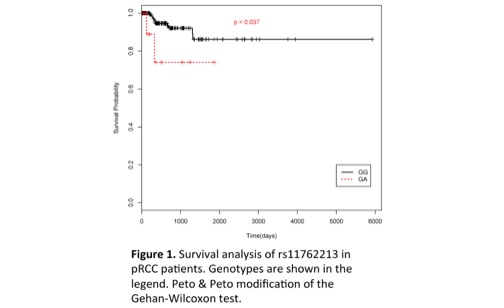| NEAUA Main Site | | | Past & Future Meetings |
|

|
Whole-genome Analysis of Papillary Kidney Cancer Finds Significant Non-Coding Alterations Shantao Liu, PhD1, Brian Shuch, MD2, Mark Gerstein, PhD1. 1Yale Department of Molecular Biophysics and Biochemistry, New Haven, CT, USA, 2Yale Department of Urology, New Haven, CT, USA.
BACKGROUND: Papillary renal cell carcinoma (pRCC) is the second most common subtype of renal cell carcinoma (RCC). Previous studies, focusing mostly on the protein-coding regions, have identified several key genomic alterations but have not found key driver mutations in a significant portion of pRCC. We carry out the first whole genome study of pRCC to discover triggering DNA changes explaining these cases. METHODS: We downloaded whole exome (WES) and whole genome sequencing (WGS) variation calls from 277 tumors included in the Cancer Genome Atlas (TCGA) data pRCC project. Copy number data, protein expression (RPPA), gene expression (RNA-seq), and methylation data was similarly obtained along with clinical and pathologic data. A prognostic MET polymorphism in clear cell RCC was evaluated (rs11762213) in the cohort. Evolutionary trees were generated based on mutation allele frequencies and structure variations. Structural variants and non-coding alterations were assessed in novel pipelines developed at Yale from WGS data. RESULTS: A total of 21 MET mutations were identified in the 277 patient cohort (7.6%), with the majority of cases identified in papillary type 1 histology and in the tyrosine kinase domain. We found 14 patients that carried one risk allele of rs11762213 (G>A). Among 96 type II pRCC, 7 patients carried the A allele (allele frequency of 3.7%). Cancer-specific mortality was significantly worse in type II patients carrying the A risk allele of rs11762213 (p= 0.034, Figure 1). We did not observe a statistically significant correlation of the rs11762213 polymorphism with MET RNA expression or c-MET pY1235 levels. (p>0.1) We discovered several (6/35, 17.1%) potentially impactful noncoding mutations in the MET promoter and its first two introns perhaps responsible for an alternate transcript recently found to be a driver alteration. Non-coding mutations that were discovered included a potentially impactful long non-coding RNA (NEAT1) implicated in cancer. Moreover, the NEAT1 mutations were associated with increased expression and unfavorable outcome (Figure 2). We identified high-impact mutations in 6/35 (17.1%) within a 6.5kb region on chromosome 1 located upstream of ERRFI1 (ERBB Receptor Feedback Inhibitor 1), a negative regulator of EGFR family members. CONCLUSIONS: We elaborate on previous results on MET, discovering more somatic alternations and finding a germline SNP in this gene (rs11762213) that may impact survival for type II pRCC. Non-coding, intronic mutations were discovered including potentially impactful ones in regions associated with MET and NEAT1 implicated in cancer. Moreover, the NEAT1 mutations are associated with increased expression and unfavorable outcome. These critical mutations newly identified from scrutinizing the entire genome help complete our understanding of pRCC genomes. Our study provides valuable additional information to facilitate better tumor subtyping, risk stratification, and potentially clinical management. Back to 2017 Program |
|
Photos courtesty of Old Port of Montréal © Tourisme Montréal, Stéphan Poulin.




